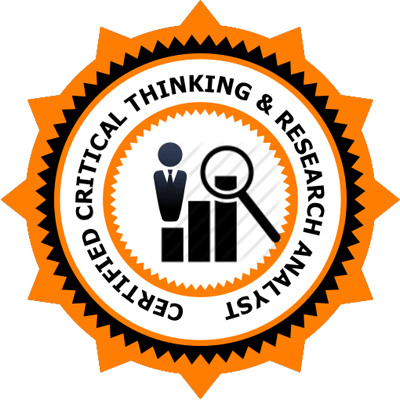Certified Critical Thinking and Research Analyst (CCTRA)
Exam Code: CCTRA-001

A research analyst is a professional who is responsible for reviewing, collecting, and reporting on a variety of data sets and information sources. Analysts are very common in the sciences, particularly in pharmaceutical research, though they exist in almost any discipline that deals with data or information assessment over time. In most cases, research analysts have at least graduate-level education, as well as a great deal of experience within their subject area. Their reports are often used to drive new innovations or direct future developments.
In today's society, many people experience information overload. We are bombarded with messages to believe various ideas, purchase things, support causes, and lead our lifestyle in a particular way. How do you know what to believe? How do you separate the truth from the myths?
The answer lies in critical thinking skills. The ability to clearly reason through problems and to present arguments in a logical, compelling way has become a key skill for survival in today's world.
In this age of information overload, it can be hard to know where to find good information that you can trust. If you're doing research for an important project, report, or proposal, how do you find information that you can count on?
Areas of Work
Work for research analysts is most plentiful in disciplines that rely on data for making decisions. The financial and banking industries, as well as many business strategists, hire analysts with some regularity. There also tend to be plentiful openings in the sciences, where test results and experimental outcomes must be documented, analyzed, and often codified.
Main Goals and Purposes
Most researchers work as members of information-gathering teams. They correlate and analyze data both internally and externally, and validate information against trade publications and other leading papers in order to provide support and validity to current theories or hypotheses.
Analysts typically compile the data they find into comprehensive reports for executives and, in some cases, corporate shareholders. Detailed data sets are usually very important when it comes to learning from the past and making reasoned predictions about the future. Executives often use the information in analysts' reports to make decisions about investments and new projects.
E-Course Duration: 10 to 15 Hours




